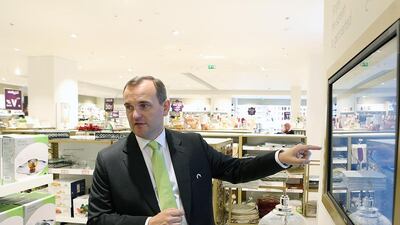Cast an eye to the ceiling of Home Centre in Mall of the Emirates and you’ll notice several triangles.
Before long, these sensors will make smartphones come alive and enable the refurbished flagship store to interact with arriving shoppers.
RFID (radio frequency identification) has been available for years – but only now is the technology’s full potential being realised and applied.
Médéric Payne, the Home Centre chief executive, is positioning his chain to lead the regional charge.
“I’m excited about RFID – it is the backbone of the future of retail and the more retailers embrace it, the more customers will get it,” he says. “We haven’t got a choice. The technology is coming – either you run with it, shape it to your advantage, or become a dinosaur. I want to be the former.”
So why is Mr Payne so excited?
RFID will, in some respects, further bridge the gap between e-commerce and physical shops.
Ceiling sensors – or beacons – identify loyal customers when they arrive, via the internet or Bluetooth on their phone. Depending on what a retailer sells or instructs a system to do, visitors can be guided through the shop, maybe towards products previously researched via smartphone.
In what some label a “barcode revolution”, a unique identification chip - or digital barcode - will also be fitted to every product, enabling it to be tracked.
It could prompt a product to “speak” to a passing shopper via their smartphone or activate a screen if the product is handled, in the case of fashion perhaps showing persuasive catwalk footage of a designer dress hanging close by.
RFID can be used in different ways, depending on retail genre. For most, the product chip will deliver stock visibility along all touchpoints from factory to shelf, revealing availability and automating stock counts.
Therein lies a potential speed hump, however. RFID demands extensive accurate, relevant data be embedded for every item, from the start of the supply chain. And education among manufacturers, says Mr Payne, highlighting intensive behind-the-scenes preparation for RFID.
“The next phase is getting products and suppliers to line-up. One of the pinch points today is aligning the right service providers with the output you are looking for,” he explains.
“Hardware is wired, we’ve got the chips vendor, now we have to get suppliers on board. It’s not just the store, it’s about the factory, logistics, the warehouse.”
That said, Mr Payne is keen not to ambush customers. He says people and brands are still assessing how much technology they aspire.
In his RFID-ready store, shoppers have a flavour of how it works courtesy of a ‘wayfinder’ console giving layout and product info, kiosks for browsing product lines and interactive screens comparing items from all Landmark brands.
Additionally, employees roam with iPads, smart mobile payment devices and a 3D ‘room styler’ that places furniture in a mock-up of your home.
Mr Payne doesn’t confirm when RFID will go live at the Mall of Emirates outlet, but is “looking at a two-year programme” to take it to the entire Home Centre estate.
Elsewhere, branches of fashion chain Zara operated by Azalea Group are incorporating RFID. They declined to discuss details, but one likely application alerts stockroom staff when garment sizes need replenishing.
Virgin Megastore is also “moving to RFID” and “experimenting” with how it will be used, says MENA president Nisreen Shocair.
“We’ve always been believers, it was just too expensive and return on investment too high. It’s becoming more affordable and solves issues around inventory management and supply chains,” she says.
“RFID – with things like ‘endless aisle’ where you have screens which show what kind of product is in the warehouse, or another shop, so not every box is actually in the store - becomes astronomical.”
As physical outlets compete with e-commerce or create synergy with their website, RFID can effectively equip stores with the kind of tricks that prompt online purchases.
Zebra Technologies is a British firm, which helps retailers, including companies in the UAE, implement smarter trading solutions, including technology that effectively blends the worlds of data-led virtual shopping and data-informed physical shopping.
“It’s creating a more intelligent store - we can identify customers and products,” says Mark Thomson, director of retail & hospitality EMEA at Zebra Technologies.
“If I’ve identified you as a customer – through the loyalty programme, you’ve signed in or been recognised by the beacons, with your permission – if I know where you are and products are I know you’re looking at certain types of product in the same way on an Amazon website.”
Mr Payne says it’s “just a matter of time” before everyone wakes up to this.
“It’s trying to convince not only the customer to embrace changes but also your own company…what’s the return on investment, where does it create value?” he says.
“You’ve got to pitch it between what’s right for the customer, what’s right for the DNA of the company and trying to get people in the company behind it and get sufficient momentum so it’s meaningful and hopefully sustainable.”
business@thenational.ae
Follow The National's Business section on Twitter

